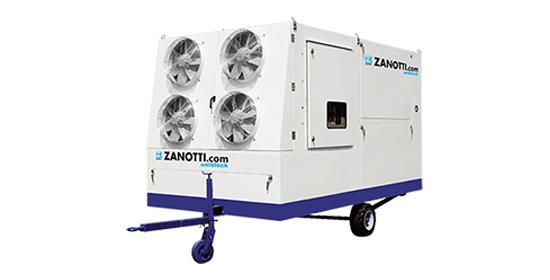DUK

Refrigerated storage DUK - Unit for grain storage
The DUK uniblock built on wheels for refrigerated storage of loose cereals stored in silos or warehouses, by means of blowing temperature and humidity controlled air.
In other word DUK is a special units, on wheels, for the preservation of food grains in silos or warehouses, by means of blowing temperature and humidity controlled air. Refrigerant R404A.
- Grain Storage DUK
Savings In The Costs Of The Drying Process
For a preservation of food grains that is require preliminary drying, essential for their conservation, this refrigerated storage will allow for climate controlled storage with a residual moisture of approximately 2% which is much better than the current norm (13 % - 14 %).
We can thus store the cereal with a humidity around 16%; in these conditions, if the mass of the cereal is taken, with the refrigeration, to a temperature of abt. 10°C, we can effect a longer period of storage (6 - 8 months or longer) without further intervention.
- temperature
- relative humidity
Furthermore, thanks to the reduced ther¬mal conductivity of the cereal, particularly if it is dried, the mass of the product, taken to 10°/12° C, will maintain it for much longer.
Reduction Of Product Loss During Storage
A great part of weight losses of cereals in the course of their storage is related to the development and accumulation of heat in their mass; it is estimated that the losses due to the consequential accumulation of heat in the cereals are in excess of 10% ¬15% in the course of a season. With refrigerated storage these losses are practically eliminated.
A) Reduction of losses due to the metabolism of the cereals.
Because of the phenomenon of metabolic "breathing", the cereal absorbs oxygen expelling carbon dioxide, water and heat with consequent loss of weight and increase of the temperature. It is estimated that in one month a cereal having a 15% RH stored at 30°C loses approximately 0,3% in weight; at 10°C the loss is only 0,02%. It follows that the product has to be maintained at the lowest temperature possible by use of refrigeration.
B) Reduction of losses due to mould, parasites, micro-organisms.
The activity and reproduction of parasites and mould is enhanced by the high temperature of storage; the ideaI conditions for reproduction are when normal temperature is at 25°/ 30°C. At temperatures of 5°/l0°C, the activity of parasites is so greatly reduced that the relative losses of weight are reduced to minimal values.
Increased Product Quality
A) Reduction if Product Breakage. Broken grain has a far greater breathing capacity than whole grain.
Through refrigeration we eliminate the need to manipulate the cereals for re¬cycling operations. This greatly reduces the percentage of product breakage and consequently results in a better product by reducing the weight loss, due to the heat of respiration.
B) Elimination of the need to add insecticides and disinfecting treatment.
This allows for the high quality standards required by the more demanding clients in the Dietary Food and Pharmaceutical sectors, allowing for the most rigorous testing and analytical controls. A Disinfecting treatment is very costly and a difficult process to achieve that can cause product pollution and potentially compromise its organic quality. Furthermore, whilst the spread of infectants or mould is limited, this does not affect their larvae or spores.
Advantages
- low drying costs
- more rational storage
- better quality of products
- reduced losses during storage

